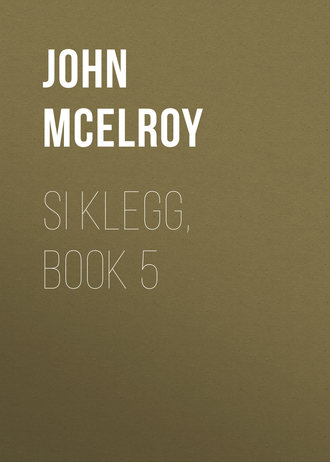 полная версия
полная версияSi Klegg, Book 5
"A thief always gits fetched up with," said Shorty, in a tone of profound moralizing. "But since it had to go I'm glad one o' our own boys got it. I snatched another and a better one that night from the Ohio boys. I'm awful sorry you got hurt. Was it bad?"
"Yes. The doctors thought I'd lose my leg, and discharged me. But I got well, and as soon as they'd take me I re-enlisted. Wish I was back in the old regiment, though. Say, you'll have to go to Headquarters with me, because that's orders, but you just walk alongside o' me. I want to talk to you about the boys."
As they walked along, the Sergeant found an opportunity to say in low tone, so that the rest could not hear:
"Old Billings, who used to be Lieutenant-Colonel, is Provost-Marshal. He's Lieutenant-Colonel of our regiment. He'll be likely to give you a great song and dance, especially if he finds out that you belonged to the old regiment. But don't let it sink too deep on you. I'll stand by you, if there's anything I can do."
"Much obliged," said Shorty, "but I'm all right, and I oughtn't to need any standing by from anybody. That old fly-up-the-crick ought to be ashamed to even speak to a man who's bin fightin' at the front, while he was playin' off around home."
"He'll have plenty to say all the same," returned the Sergeant. "He's got one o' these self-acting mouths, with a perpetual-motion attachment. He don't do anything but talk, and mostly bad. Blame him, it's his fault that we're kept here, instead of being sent to the front, as we ought to be. Wish somebody'd shoot him."
The Provost-Marshal was found in his office, dealing out sentences like a shoulder-strapped Rhadamanthes. It was a place that just suited Billings's tastes. There he could bully to his heart's content, with no chance for his victims getting back at him, and could make it very uncomfortable for those who were disposed to sneer at his military career. With a scowl on his brow, and a big chew of tobacco in his mouth, he sat in his chair, and disposed of the cases brought before him with abusive comments, and in the ways that he thought would give the men the most pain and trouble. It was a manifestation of his power that he gloated over.
"Take the position of soldiers, you slouching clodhoppers," he said, with an assortment of oaths, as the squad entered the office. "One'd think you a passel o' hawbucks half-drunk at a log-rollin', instead o' soldiers in the presence o' your superior officer. Shut them gapin' mouths, lift up them shock-heads, button up your blouses, put your hands down to your sides, and don't no man speak to me without salootin'. And mind what you say, or I'll give you a spell on bread and water, and send you back in irons. I want you to understand that I'll have no foolishness. You can't monkey with me as you can with some officers.
"Had your pocket picked, and your furlough as well as your money taken," he sneered to the first statement. "You expect me to believe that, you sickly-faced yallerhammer. I'll just give you five days' hard labor before sending you back, for lying to me. Go over there to the left, and take your place in that police squad."
"No," he said to the second, "that sick mother racket won't work. Every man we ketch now skulking home is goin' to see his sick and dying mother. There wouldn't be no army if we allowed every man who has a sick mother to go and visit her. None o' your back talk, or I'll put the irons on you."
"No," to a third, "you can't go back to your boarding place for your things, not even with a guard. I know you. You'd give the guard the slip before you went 10 rods. Let your things go. Probably you stole 'em, anyway."
Lieut.-Col. Billings's eye lighted on Shorty, with an expression of having seen him somewhere.
"Where do you belong?" he asked crossly.
"Co. Q, 200th Injianny Volunteer Infantry," replied Shorty proudly.
"Yes. I remember you now," said the Provost-Marshal savagely. "You're one o' them infernal nigger-thieves that brung disgrace on the regiment. You're one o' them that made it so notorious that decent men who had a respect for other people's property was glad to get out of it."
"You're a liar," said Shorty hotly. "You didn't git out o' the regiment because it stole niggers. That's only a pretend. The rear is full o' fellers like you who pretend to be sore on the nigger question, as an excuse for not going to the front. You sneaked out o' every fight the regiment went into. You got out of the regiment because it was too fond of doin' its duty."
"Shut up, you scoundrel! Buck-and-gag him, men," roared Billings, rising and shaking his fist at him.
"Stop that! You musn't talk that way," said the Sergeant, going over to Shorty, and shaking him roughly, while he whispered, "Don't make a blamed fool o' yourself. Keep quiet."
"I won't stop," said Shorty angrily; "I won't let no man talk that way about the 200th Ind., no matter if he wears as many leaves on his shoulders as there is on a beech tree. I'd tell the Major-General that he lied if he slandered the regiment, if I died for it the next minute."
"I order you to take him out and buck-and-gag him," shouted the Provost-Marshal.
The Sergeant caught Shorty by the shoulder, and pushed him out of the room, with much apparent roughness, but really using no more force than would make a show, while muttering his adjurations to cool down.
"I s'pose I've got to obey orders, and buck-and-gag you," said the Sergeant ruefully, as they were alone together in the room. "It goes against my grain, like the toothache. I'd rather you'd buck-and-gag me. But you are to blame for it yourself. You ought to have more sense than lay it into a Lieutenant-Colonel and Provost-Marshal that way. But you did give it to him fine, the old blow-hard and whisky-sucker. He's no more fit for shoulderstraps than a hog is for a paper-collar. Haven't heard anything for a long time that tickled me so, even while I was mad enough to pound you for having no more sense. I've bin aching to talk that way to him myself."
"Go ahead and obey your orders," said Shorty. "Don't mind me. I'm willin' to take it. I've had my say, which was worth a whole week o' buckin'. It 'll be something to tell the boys when I git back, that I saw old Billings swellin' around, and told him right before his own men just what we think of him. Lord, how it 'll tickle 'em. I'll forgit all about the buckin', but they won't forgit that."
"Blamed if I'll do it," said the Sergeant. "He can take off my stripes, and be blest to him. You said just what I think, and what we all think, and I ought to stand by you. I've a notion to go right back in the room and tell him I won't do it, and pull off my stripes and hand 'em to him, and tell him to take 'em and go to Halifax."
"Now, don't be a fool, Jim," remonstrated Shorty. "You won't help me, and you'll git yourself into trouble. Somebody's got to do it, and I'd rather it'd be you than somebody else. Go ahead and obey your orders. Git your rope and your stick and your bayonet."
"They're all here," said the Sergeant, producing them, with a regretful air. "We've plenty of use for them as long as old Billings is on deck. Say," said he, stopping, as a brighter look came into his face, "I've got an idea."
"Hold on to it till you kin mark its ears, so's you'll know it again for your property," said Shorty sarcastically. "Good idees are skeerce and valuable."
"Jeff Wilson, the General's Chief Clerk, who belongs to my company," said the Sergeant, "told me yesterday that they wanted another Orderly, and to pick out one for him. I'll send a note for him to detail you right off."
He hastily scratched off the following note on a piece of wrapping paper, folded it up, and sent secretly one of his boys on a run with it:
"Dear Jeff: Found you a first-class Orderly. It's Shorty, of my old regiment. He's in Billings's clutches, and in trouble. Send down a detail at once for Shorty Elliott, Co.
Q, 200th Ind. Rush. Yours, Jim."
"Here, Sergeant," called out the Provost-Marshal from the other room, "what are you fooling around in there so long for?"
"Somebody's been monkeying with my things," called back the Sergeant. "If they don't let 'em alone I'll scalp somebody."
"Well, get through, and come out here, for there's some more work for you. Make a good job with that scoundrel. I'll be in presently and see it."
Shorty squatted down, and the Sergeant made as easy going an imitation as he could of the punishment.
The messenger encountered the young General near by, limping along on a conscientious morning inspection of things about his post. He had been but recently assigned to the position, to employ him while he was getting well of his wound received at Chickamauga, and was making a characteristic effort to know all about his command. He had sent his staff on various errands, but had his Chief Clerk with him to make notes.
"What's that?" he inquired, as the messenger handed the latter the note.
"Just a note from the Sergeant of the Guard about an Orderly," answered the clerk.
"Let me see it," said the General, who had an inveterate disposition for looking into the smallest details. "What's this? One of the 200th Ind.? Why, that was in my brigade. The 200th Ind. was cut all to pieces, but it stuck to that Snodgrass Hill tighter than a real-estate mortgage. One of the boys in trouble? We'll just go over to the Provost-Marshal's and see about him. It may be that I know him."
The sharp call of the Sergeant on duty outside to "Turn out the Guard for the General," the clatter of muskets, as he was obeyed, the sudden stiffening up of the men lounging about the entrance into the position of the soldier, and their respectful salutes as the General limped in, conveyed to Lieut.-Col. Billings intelligence as to his visitor, and his whole demeanor changed to one of obsequious welcome.
"Very unexpected, General, but very kind in you to visit me," he said, bowing, and washing his hands with invisible soap.
"No kindness at all. Colonel," said the General with official curtness. "Merely my duty, to personally acquaint myself with all portions of my command. I should have visited you before. By the way, I understand you have picked up here a man belonging to my brigade—to the 200th Ind. Where is he?"
Billings's face clouded.
"Yes, we have a man who claimed to belong to that regiment—a straggler, who hadn't any papers to show. I had no idea whether he was telling the truth. He was outrageously sassy, and I had to give him a lesson to keep a civil tongue in his head. Take a seat. I'll send for him."
"No; I'll go and see him," said the General. "Where is he?"
With a foreboding that the scene was going to be made unpleasant for him, Billings led the General into the guard-room.
"Why, it's Shorty," said the General, recognizing him at once, "who ran back at Stone River, in a heavy fire, and helped me from under my horse."
Shorty winked and nodded affirmatively.
"What was the matter, Colonel?" inquired the General.
"Well," said Billings, defensively, "the feller is a straggler, without papers to show where he belonged, and he was very sassy to me—called me a liar, and said other mean things, right before my men, and I had to order him bucked-and-gagged to shut him up."
"Strange," said General; "I always found him very respectful and obedient. I thought I hadn't a better soldier in my brigade."
Shorty winked appreciatively at Serg't Elkins.
"Take out the gag, let him up, and let me hear what he has to say," said the General.
Shorty was undone and helped to his feet, when he respectfully saluted. His weakness was so apparent that the General ordered him to sit down, and then asked him questions which brought out his story. "You were promoted Corporal, if I recollect," said he, "for gallantry in capturing one of the rebel flags taken by my brigade."
"Yes, sir," answered Shorty.
Billings was feeling very uncomfortable.
"He called me a liar, and a stay-at-home sneak, and other insultin' things," protested he.
"General, he slandered the 200 Ind., which I won't allow no man to do, no matter what he has on his shoulders. I told him that he'd bin fired out o' the regiment, and was a-bummin' in the rear, and hadn't no business abusin' men who was doin' and respectful."
"Hum—very insubordinate, very unsoldierly," said the General. "Very unlike you. Corporal. I'm surprised at you. You were always very obedient and respectful."
"Always to real officers," said Shorty; "but—"
"Silence," said the General, sternly. "Don't aggravate the offense. You were properly punished."
"I ain't kickin' about it," said Shorty stubbornly. "I've got the worth of it."
"I think," continued the General, after having properly vindicated discipline, "that that blow you received on your head may affect your brain at times, and make you unduly irritable. I think I'll have the Surgeon examine you. Put him in an ambulance, Wilson, and take him over to the Surgeon. Then bring him to Headquarters with the report."
Turning to the Lieutenant-Colonel the General said:
"I had another object in visiting you this morning. Colonel. I've got some good news for you. I've found your officers and men very weary of their long tour of provost duty here, and anxious to go to the front. Of course, I know that you feel the same way."
Billings tried to look as if he did, but the attempt was not a success.
"I have represented to Headquarters, therefore," continued the General, "that it would be to the advantage of the service to have this fine full regiment sent to the front, and its place taken by one that has been run down by hard service, and so get a chance for it to rest and recruit. The General has accepted my views, and orders me to have you get ready to move at once."
"I have tried to do my dooty here, and I thought," murmured Billings, "that it was to the advantage of the Government to have as Provost-Marshal a man who knowed all these fellers and their tricks. It'd take a new man a long time to learn 'em."
"I appreciate that," said the General. "But it's not just to you or your men to make you do so much of this work. I'm expecting every minute notice of a regiment being sent to relieve yours, and therefore you will be ready to start as soon as it arrives. Good morning, sir."
The only relief that Billings could find to his feelings after the General's departure was to kick one of the men's dog out of his office with a great deal of vindictiveness.
CHAPTER X. SHORTY AS ORDERLY
HAS A TOUR OF DUTY AT THE GENERAL'S HEADQUARTERS"WELL," said the General, after he had listened to Shorty's story, and questioned him a little, "you are all right now. I'll take care of you. The Surgeon says that you are not fit to go back to the front, and will not be for some time. They have got more sick and convalescents down there now than they can take good care of. The army's gone into Winter quarters, and will probably stay there until Spring opens, so that they don't need either of us. I'll detail you as Orderly at these Headquarters, and you can go back with me when I do."
"I s'pose that's all right and satisfactory," said Shorty, saluting. "It's got to be, anyway. In the army a man with a star on his shoulder's got the last say, and kin move the previous question whenever he wants to. I never had no hankerin' for a job around Headquarters, and now that I'm a Korpril I ought to be with my company. But they need you worse'n they do me, and I've noticed that you was always as near the front as anybody, so I don't think I'll lose no chances by stayin' with you."
"I promise you that we shall both go as soon as there's any prospect of something worth going for," said the General, smiling. "Report there to Wilson. He will instruct you as to your duties."
Wilson's first instructions were as to Shorty's personal appearance. He must get a clean shave and a hair-cut, a necktie, box of paper collars, a pair of white gloves, have blouse neatly brushed and buttoned to his throat and his shoes polished.
"Dress parade every day?" asked Shorty, despairingly.
"Just the same as dress parade every day," answered the Chief Clerk. "Don't want any scarecrows around these Headquarters. We're on dress parade all the time before the people and other soldiers, and must show them how soldiers ought to appear. You'll find a barber-shop and a bootblack around the corner. Make for them at once, and get yourself in shape to represent Headquarters properly."
"Don't know but I'd ruther go to the front and dig rifle-pits than to wear paper collars and white gloves every day in the week," soliloquized Shorty, as he walked out on the street. "Don't mind 'em on Sunday, when you kin take 'em off agin when the company's dismissed from parade; but to put 'em on in the mornin' when you git up, and wear 'em till you go to bed at night—O, Jehosephat! Don't think I've got the constitution to stand that sort o' thing. But it's orders, and I'll do it, even if it gives me softenin' o' the brain. Here, you—(beckoning to a bootblack), put a 250-pounder Monitor coat o' polish on them Tennessee River gunboats. Fall in promptly, now."
The little darky gave an estimating glance at the capacious cowhides, which had not had a touch of the brush since being drawn from the Quarter master, and then yelled to a companion on the other side of the street:
"Hey, Taters, come lend me a spit. I'se got a' army contrack."
"Vhat golor off a gravat do you vant?" asked the Jewish vender of haberdashery, who was rapidly amassing a fortune from the soldiers. "Dere's plack, red, kreen, plue—all lofely golors, unt de vinest kint off silk. Yoost de same as Cheneral Krant vears. He puys lods off me. Von't puy off nopody else vhen he gan ket to me. Now, dere's vun dat'll yoost suit your light gomplexion. You gan vear dat on St. Batrick's day."
And he picked out one of bright green that would have made Shorty's throat seem in wild revolt against his hair.
"Well, I don't know," said Shorty meditatively, pulling over the lot. Then a thought struck him. Taking out the bit of Maria's dress, he said:
"Give me something as near as possible the color of that."
"Veil, I've kot rid off datt off-golored negdie, dat I fought I nefer vould sell," meditated the Jew, as Shorty left. "I'm ahet yoost a tollar-unt-a-haluf on aggount off dat vild Irishman's kirl. Veil, de kirls ket some fellers into sgrapes, unt helps udders oud."
With this philosophical observation the Jew resumed his pleasant work of marking up his prices to better accord with his enlarged views as to the profits he could get off the soldiers.
When Shorty returned to Headquarters, neatly shaven and brushed, and took the position of a soldier before the Chief Clerk, that functionary remarked approvingly:
"Very good, very good, indeed. You'll be an ornament to Headquarters."
And the General, entering the room at that time, added:
"Yes, you are as fine a looking soldier as one would wish to see, and an examaple to others. But you have not your Corporal's chevrons on. Allow me to present you with a pair. It gives me pleasure, for you have well earned them."
Stepping back into his office he returned with the chevrons in his hand.
"There, find a tailor outside somewhere to sew them on. You are now a non-commissioned officer on my staff, and I expect you to do all you can to maintain its character and dignity."
Shorty's face flushed with pride as he saluted, and thought, without saying:
"You jest bet I will. Any loafer that don't pay proper respect to this here staff'll git his blamed neck broke."
"Here," said the Chief Clerk, handing Shorty an official envelope, when the latter returned from having his chevrons sewed on. "Take this down to Col. Billings. Mind you do it in proper style. Don't get to sassing old Billings. Stick the envelope in your belt, walk into the office, take the position of a soldier, salute, and hand him the envelope, saying, 'With the compliments of the General,' salute again, about-face, and walk out."
"I'll want to punch his rotten old head off the minute I set eyes on him," remarked Shorty, sotto voce; "but the character and dignity of the staff must be maintained."
Lieut.-Col. Billings started, and his face flushed, when he saw Shorty stalk in, severely erect and soldierly. Billings was too little of a soldier to comprehend the situation. His first thought was that Shorty, having been taken under the General's wing, had come back to triumph over him, and he prepared himself with a volley of abuse to meet that of his visitor. But Shorty, with stern eyes straight to the front, marched up to him, saluted in one-two-three time, drew the envelope from his belt, and thrusting it at him as he would his gun to the inspecting officer on parade, announced in curtly official tones, "With General's compliments, sir," saluted again, about-faced as if touched with a spring, and marched stiffly toward the door.
Billings hurriedly glanced at the papers, and saw that instead of some unpleasant order from the General, which he had feared, they were merely some routine matters. His bullying instinct at once reasserted itself:
"Puttin' on a lot o' scollops, since, just because you're detailed at Headquarters," he called out after Shorty. "More style than a blue-ribbon horse at a county fair, just because the General took a little notice of you. But you'll not last long. I know you."
"Sir," said Shorty, facing about and stiffly saluting, "if you've got any message for the General, I'll deliver it. If you hain't, keep your head shet."
"O, go on; go on, now, you two-for-a-cent Corporal. Don't you give me any more o' your slack, or I'll report you for your impudence, and have them stripes jerked offen you."
Hot words sprang to Shorty's lips, but he remembered the General's injunction about the character and dignity of the staff, and restrained himself to merely saying:
"Col. Billings, some day I won't belong to the staff, and you won't have no shoulder-straps. Then I'll invite you to a little discussion, without no moderator in the chair."
"Go on, now. Don't you dare threaten me," shouted Billings.
"How'd you get along with Billings?" inquired the Chief Clerk, when Shorty returned.
"About as well as the monkey and the parrot did," answered Shorty, and he described the interview, ending with:
"I never saw a man who was achin' for a good lickin' like that old bluffer. And he'll git it jest as soon as he's out o' the service, if I have to walk a hundred miles to give it to him."
"I'm afraid you'll have to wait a good while," answered Wilson. "He'll stay in the service as long as he can keep a good soft berth like this. He's now bombarding everybody that's got any influence with telegrams to use it to keep him here in the public interest. He claims that on account of his familiarity with things here he is much more valuable to the Government here than he would be in the field."
"No doubt o' that," said Shorty. "He ain't worth a groan in the infernal regions at the front. He only takes the place and eats the rations of some man that might be of value."
"See here," said Wilson, pointing to a pile of letters and telegrams on his desk. "These are protests against Billings being superseded and sent away. More are coming in all the time. They are worrying the General like everything, for he wants to do the right thing. But I know that they all come from a ring of fellows around here who sell whisky and slop-shop goods to the soldiers, and skin them alive, and are protected by Billings. They're whacking up with him, and they want him to stay. I'm sure of it, but I haven't any proof, and there's no use saying anything to the General unless I've got the proof to back it."
"Wonder if I couldn't help git the proof," suggested Shorty, with his sleuth instincts reviving.
"Just the man," said the Chief Clerk eagerly, "if you go about it right. You're a stranger here, and scarcely anybody knows that you belong to Headquarters. Get yourself back in the shape you were this morning, and go out and try your luck. It'll just be bully if we can down this old blowhard."
Shorty took off his belt and white gloves, unbuttoned his blouse, and lounged down the street to the quarter where the soldiers most congregated to be fleeced by the harpies gathered there as the best place to catch men going to or returning from the front. Shorty soon recognized running evil-looking shops, various kinds of games and drinking dens several men who had infested the camps about Nashville and Murfreesboro until the Provost-Marshal had driven them away.









